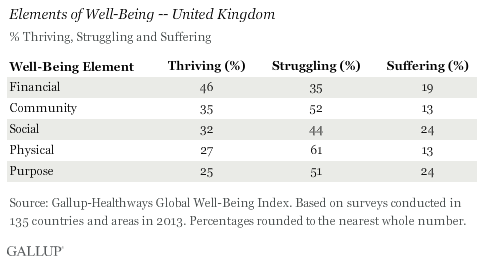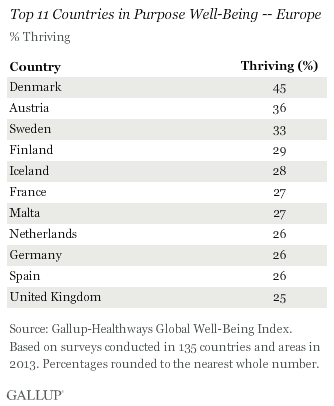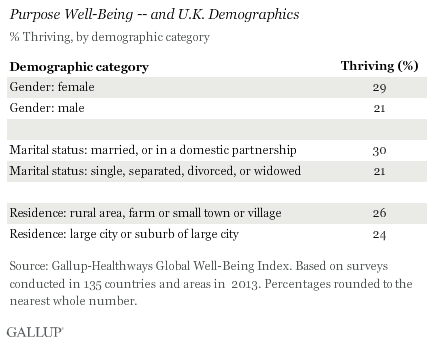STORY HIGHLIGHTS
- Twenty-five percent of Britons thriving in purpose well-being
- Half of Britons thriving in financial well-being
- Men, single residents struggle most in purpose well-being
WASHINGTON, D.C. — Nearly half of United Kingdom residents in 2013 (46%) were thriving — or strong and consistent — in their financial well-being, according to the Gallup-Sharecare Global Well-Being Index. This is their strongest area of well-being and outpaces the average for Europe (37%) and even other OECD countries (38%). But one of their weakest areas is purpose well-being, with about half as many U.K. residents (25%) thriving in this element.
The Gallup-Sharecare Global Well-Being Index measures each of the five elements of well-being — purpose, social, financial, community, and physical — through Gallup’s World Poll. The 2013 study presents a barometer of individuals’ perceptions of their well-being and is organized into the five elements:
- Purpose: liking what you do each day and being motivated to achieve your goals
- Social: having supportive relationships and love in your life
- Financial: managing your economic life to reduce stress and increase security
- Community: liking where you live, feeling safe and having pride in your community
- Physical: having good health and enough energy to get things done daily
In analyzing the results of the index, Gallup classifies responses as “thriving” (well-being that is strong and consistent), “struggling” (well-being that is moderate or inconsistent) or “suffering” (well-being that is low and inconsistent). “Achieving a balance across the five elements of well-being is both a measure of success in its own right, and a signpost to better health and greater productivity both at work and at home,” says Peter Choueiri, President of Sharecare International.
The quarter of U.K. residents who are thriving in purpose well-being is roughly in line with the average for Europe (22%). Four European countries score statistically better in purpose well-being — Denmark, Austria, Sweden and Finland. Denmark scored the highest in the region, with 45% of its residents thriving in this element — 20 percentage points higher than the U.K.
Men and Single People in U.K. Least Likely to Thrive in Purpose Well-Being
Women in the U.K. and those who are married or in a domestic partnership are most likely to be thriving in purpose well-being; nearly three in 10 in each group are thriving. Men and unmarried people are least likely to be thriving in purpose well-being (both 21%).
Residence did not affect U.K. residents’ level of thriving in purpose well-being. Those who lived in rural areas and those who lived in cities were almost equally likely to be thriving.
Higher Workplace Engagement Related to Purpose Well-Being
For many U.K. residents, informal or formal employment encompasses the majority of their waking hours each day and likely factors into their purpose well-being — because it involves people liking what they do each day and being motivated to reach their goals. “Having rightly focused on economic improvement since the start of the Great Recession, it is now important to focus on sustaining the recovery by helping ensure that U.K. residents feel engaged with their work and potentially improving their well-being in purpose,” says Oliver Harrison, U.K.-based Senior Vice President of Healthways International, now Sharecare.
Gallup’s global study of employee engagement found that 17% of employed U.K. residents in 2012 were engaged at work — or emotionally invested in and focused on creating value for their organizations every day. While this was one of the highest percentages reported among 19 countries in Europe, and was surpassed only by Denmark (21%), Malta (19%), Portugal (19%) and Spain (18%), 26% of U.K. residents were actively disengaged from — or negative and potentially hostile to — their organizations. This was tied with France for the highest percentage in Europe.
Eliminating active disengagement would result in a significantly higher output per worker. Gallup estimates that these employees cost the U.K. between $83 billion and $112 billion per year. To do that, organizations must develop more innovative ways of maximizing their human capital — for example, by ensuring the right managers are in the right roles. “Organizations that are relentless in selecting and developing great managers are in the best position to weather any macroeconomic storms. Great managers identify the strengths of each person they manage and connect each person’s role to the purpose of the organization,” says Jim Harter, a workplace management scientist at Gallup.
Implications
Initiatives targeted at demographic groups such as young men, where low purpose well-being is more common, could affect not only U.K. residents’ positive feelings about their daily lives, but about the broader U.K. economy as well. Gallup research has shown that when people are able to achieve personal measures of success and well-being in their daily purpose, they tend to evaluate their lives more highly in the present and for the future. This is especially important for young people, among whom high unemployment rates and a lack of opportunity are thought to contribute to social unrest. Efforts targeted at the young, particularly through educational opportunities that increase employment competitiveness, may provide better employment prospects, higher salaries and increased social stability.
SURVEY METHODS
Gallup-Sharecare Global Well-Being Index results are based on telephone interviews conducted April 30-June 6, 2013, as part of the Gallup World Poll, with a random sample of 750 adults, aged 15 and older, living in the United Kingdom. For results based on the total sample of national adults, the margin of sampling error is ±4.3 percentage points at the 95% confidence level. All reported margins of sampling error include computed design effects for weighting.
All country-level analyses use country weights. Global and regional analysis uses projection weights that account for country size. Minimum sample sizes of N=300 apply.
In addition to sampling error, question wording and practical difficulties in conducting surveys can introduce error or bias into the findings of public opinion polls.
Learn more about how the Gallup-Sharecare Well-Being Index and the Gallup World Poll work.
Each element in the Global Well-Being Index contains two questions asked of all respondents:
Purpose
- You like what you do every day.
- You learn or do something interesting every day.
Social
- Someone in your life always encourages you to be healthy.
- Your friends and family give you positive energy every day.
Financial
- You have enough money to do everything you want to do.
- In the last seven days, you have worried about money.
Community
- The city or area where you live is a perfect place for you.
- In the last 12 months, you have received recognition for helping to improve the city or area where you live.
Physical
- In the last seven days, you have felt active and productive every day.
- Your physical health is near-perfect.
Copyright © 2008 and 2013 WB5, LLC. All rights reserved.
Gallup Employee Engagement
Gallup has conducted two waves of worldwide employee engagement research, the first based on data collected in 2009 and 2010 and the second, on which this report is based, from data collected in 2011 and 2012. For the more recent study, engagement results were collected among 73,752 respondents in 141 non-U.S. countries via the Gallup World Poll and 151,335 U.S. respondents using Gallup Daily tracking. Employee engagement questions were asked only of those respondents who indicated they were employed for an employer, either full time or part time. Only among countries for which at least 300 employed respondents were sampled are country-level engagement data reported.


